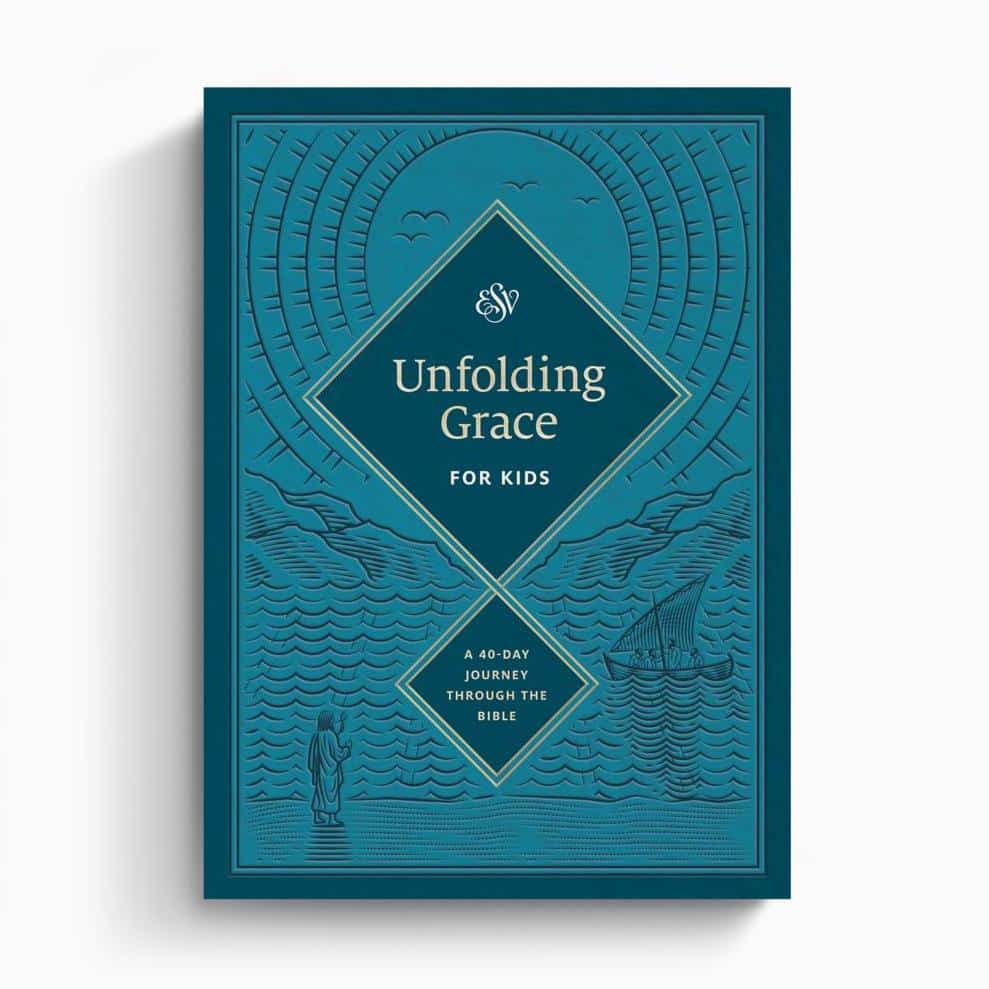LESSON SIXTEEN
Israel Receives a King
The Book of Judges ended with the line, “In those days there was no king in Israel. Everyone did what was right in his own eyes.” Israel needs a king.
This is not entirely unexpected. God promised that a descendant of Eve would crush the Serpent’s head—he would defeat evil and restore God’s blessing to our broken world. Genesis shows that this king would come through Abraham’s line, and ultimately through Judah’s tribe.
This leads to the surprise in the next story: when Israel asks for a king, God disapproves. Why? Because God looks on the heart and discerns the people’s motive. They do not want God to rule them through a faithful king; they want to rule themselves through a king, “like all the nations” do.
Yet the Lord graciously provides a king anyway. Astonishingly, Israel rejects God by requesting a king, yet God grants one to bless them (and the world) in the end. This is how God works: he folds even our rebellion into his plan to do us good. He eventually does it again through the cross of King Jesus, where humanity’s rejection of God results in lavish grace for all who receive it.
On page after page, the Bible unfolds the story of God’s unswerving commitment to bless us in spite of ourselves.
SCRIPTURE READING
1 Samuel 7-11
Reading Time: 16 Minutes
And the men of Kiriath-jearim came and took up the ark of the Lord and brought it to the house of Abinadab on the hill. And they consecrated his son Eleazar to have charge of the ark of the Lord. From the day that the ark was lodged at Kiriath-jearim, a long time passed, some twenty years, and all the house of Israel lamented after the Lord.
And Samuel said to all the house of Israel, “If you are returning to the Lord with all your heart, then put away the foreign gods and the Ashtaroth from among you and direct your heart to the Lord and serve him only, and he will deliver you out of the hand of the Philistines.” So the people of Israel put away the Baals and the Ashtaroth, and they served the Lord only.
Then Samuel said, “Gather all Israel at Mizpah, and I will pray to the Lord for you.” So they gathered at Mizpah and drew water and poured it out before the Lord and fasted on that day and said there, “We have sinned against the Lord.” And Samuel judged the people of Israel at Mizpah. Now when the Philistines heard that the people of Israel had gathered at Mizpah, the lords of the Philistines went up against Israel. And when the people of Israel heard of it, they were afraid of the Philistines. And the people of Israel said to Samuel, “Do not cease to cry out to the Lord our God for us, that he may save us from the hand of the Philistines.” So Samuel took a nursing lamb and offered it as a whole burnt offering to the Lord. And Samuel cried out to the Lord for Israel, and the Lord answered him. As Samuel was offering up the burnt offering, the Philistines drew near to attack Israel. But the Lord thundered with a mighty sound that day against the Philistines and threw them into confusion, and they were defeated before Israel. And the men of Israel went out from Mizpah and pursued the Philistines and struck them, as far as below Beth-car.
Then Samuel took a stone and set it up between Mizpah and Shen and called its name Ebenezer; for he said, “Till now the Lord has helped us.” So the Philistines were subdued and did not again enter the territory of Israel. And the hand of the Lord was against the Philistines all the days of Samuel. The cities that the Philistines had taken from Israel were restored to Israel, from Ekron to Gath, and Israel delivered their territory from the hand of the Philistines. There was peace also between Israel and the Amorites.
Samuel judged Israel all the days of his life. And he went on a circuit year by year to Bethel, Gilgal, and Mizpah. And he judged Israel in all these places. Then he would return to Ramah, for his home was there, and there also he judged Israel. And he built there an altar to the Lord.
When Samuel became old, he made his sons judges over Israel. The name of his firstborn son was Joel, and the name of his second, Abijah; they were judges in Beersheba. Yet his sons did not walk in his ways but turned aside after gain. They took bribes and perverted justice.
Then all the elders of Israel gathered together and came to Samuel at Ramah and said to him, “Behold, you are old and your sons do not walk in your ways. Now appoint for us a king to judge us like all the nations.” But the thing displeased Samuel when they said, “Give us a king to judge us.” And Samuel prayed to the Lord. And the Lord said to Samuel, “Obey the voice of the people in all that they say to you, for they have not rejected you, but they have rejected me from being king over them. According to all the deeds that they have done, from the day I brought them up out of Egypt even to this day, forsaking me and serving other gods, so they are also doing to you. Now then, obey their voice; only you shall solemnly warn them and show them the ways of the king who shall reign over them.”
So Samuel told all the words of the Lord to the people who were asking for a king from him. He said, “These will be the ways of the king who will reign over you: he will take your sons and appoint them to his chariots and to be his horsemen and to run before his chariots. And he will appoint for himself commanders of thousands and commanders of fifties, and some to plow his ground and to reap his harvest, and to make his implements of war and the equipment of his chariots. He will take your daughters to be perfumers and cooks and bakers. He will take the best of your fields and vineyards and olive orchards and give them to his servants. He will take the tenth of your grain and of your vineyards and give it to his officers and to his servants. He will take your male servants and female servants and the best of your young men and your donkeys, and put them to his work. He will take the tenth of your flocks, and you shall be his slaves. And in that day you will cry out because of your king, whom you have chosen for yourselves, but the Lord will not answer you in that day.”
But the people refused to obey the voice of Samuel. And they said, “No! But there shall be a king over us, that we also may be like all the nations, and that our king may judge us and go out before us and fight our battles.” And when Samuel had heard all the words of the people, he repeated them in the ears of the Lord. And the Lord said to Samuel, “Obey their voice and make them a king.” Samuel then said to the men of Israel, “Go every man to his city.”
There was a man of Benjamin whose name was Kish, the son of Abiel, son of Zeror, son of Becorath, son of Aphiah, a Benjaminite, a man of wealth. And he had a son whose name was Saul, a handsome young man. There was not a man among the people of Israel more handsome than he. From his shoulders upward he was taller than any of the people.
Now the donkeys of Kish, Saul’s father, were lost. So Kish said to Saul his son, “Take one of the young men with you, and arise, go and look for the donkeys.” And he passed through the hill country of Ephraim and passed through the land of Shalishah, but they did not find them. And they passed through the land of Shaalim, but they were not there. Then they passed through the land of Benjamin, but did not find them.
When they came to the land of Zuph, Saul said to his servant who was with him, “Come, let us go back, lest my father cease to care about the donkeys and become anxious about us.” But he said to him, “Behold, there is a man of God in this city, and he is a man who is held in honor; all that he says comes true. So now let us go there. Perhaps he can tell us the way we should go.” Then Saul said to his servant, “But if we go, what can we bring the man? For the bread in our sacks is gone, and there is no present to bring to the man of God. What do we have?” The servant answered Saul again, “Here, I have with me a quarter of a shekel of silver, and I will give it to the man of God to tell us our way.” (Formerly in Israel, when a man went to inquire of God, he said, “Come, let us go to the seer,” for today’s “prophet” was formerly called a seer.) And Saul said to his servant, “Well said; come, let us go.” So they went to the city where the man of God was.
As they went up the hill to the city, they met young women coming out to draw water and said to them, “Is the seer here?” They answered, “He is; behold, he is just ahead of you. Hurry. He has come just now to the city, because the people have a sacrifice today on the high place. As soon as you enter the city you will find him, before he goes up to the high place to eat. For the people will not eat till he comes, since he must bless the sacrifice; afterward those who are invited will eat. Now go up, for you will meet him immediately.” So they went up to the city. As they were entering the city, they saw Samuel coming out toward them on his way up to the high place.
Now the day before Saul came, the Lord had revealed to Samuel: “Tomorrow about this time I will send to you a man from the land of Benjamin, and you shall anoint him to be prince over my people Israel. He shall save my people from the hand of the Philistines. For I have seen my people, because their cry has come to me.” When Samuel saw Saul, the Lord told him, “Here is the man of whom I spoke to you! He it is who shall restrain my people.” Then Saul approached Samuel in the gate and said, “Tell me where is the house of the seer?” Samuel answered Saul, “I am the seer. Go up before me to the high place, for today you shall eat with me, and in the morning I will let you go and will tell you all that is on your mind. As for your donkeys that were lost three days ago, do not set your mind on them, for they have been found. And for whom is all that is desirable in Israel? Is it not for you and for all your father’s house?” Saul answered, “Am I not a Benjaminite, from the least of the tribes of Israel? And is not my clan the humblest of all the clans of the tribe of Benjamin? Why then have you spoken to me in this way?”
Then Samuel took Saul and his young man and brought them into the hall and gave them a place at the head of those who had been invited, who were about thirty persons. And Samuel said to the cook, “Bring the portion I gave you, of which I said to you, ‘Put it aside.’ ” So the cook took up the leg and what was on it and set them before Saul. And Samuel said, “See, what was kept is set before you. Eat, because it was kept for you until the hour appointed, that you might eat with the guests.”
So Saul ate with Samuel that day. And when they came down from the high place into the city, a bed was spread for Saul on the roof, and he lay down to sleep. Then at the break of dawn Samuel called to Saul on the roof, “Up, that I may send you on your way.” So Saul arose, and both he and Samuel went out into the street.
As they were going down to the outskirts of the city, Samuel said to Saul, “Tell the servant to pass on before us, and when he has passed on, stop here yourself for a while, that I may make known to you the word of God.”
Then Samuel took a flask of oil and poured it on his head and kissed him and said, “Has not the Lord anointed you to be prince over his people Israel? And you shall reign over the people of the Lord and you will save them from the hand of their surrounding enemies. And this shall be the sign to you that the Lord has anointed you to be prince over his heritage. When you depart from me today, you will meet two men by Rachel’s tomb in the territory of Benjamin at Zelzah, and they will say to you, ‘The donkeys that you went to seek are found, and now your father has ceased to care about the donkeys and is anxious about you, saying, “What shall I do about my son?” ’ Then you shall go on from there farther and come to the oak of Tabor. Three men going up to God at Bethel will meet you there, one carrying three young goats, another carrying three loaves of bread, and another carrying a skin of wine. And they will greet you and give you two loaves of bread, which you shall accept from their hand. After that you shall come to Gibeath-elohim, where there is a garrison of the Philistines. And there, as soon as you come to the city, you will meet a group of prophets coming down from the high place with harp, tambourine, flute, and lyre before them, prophesying. Then the Spirit of the Lord will rush upon you, and you will prophesy with them and be turned into another man. Now when these signs meet you, do what your hand finds to do, for God is with you. Then go down before me to Gilgal. And behold, I am coming down to you to offer burnt offerings and to sacrifice peace offerings. Seven days you shall wait, until I come to you and show you what you shall do.”
When he turned his back to leave Samuel, God gave him another heart. And all these signs came to pass that day. When they came to Gibeah, behold, a group of prophets met him, and the Spirit of God rushed upon him, and he prophesied among them. And when all who knew him previously saw how he prophesied with the prophets, the people said to one another, “What has come over the son of Kish? Is Saul also among the prophets?” And a man of the place answered, “And who is their father?” Therefore it became a proverb, “Is Saul also among the prophets?” When he had finished prophesying, he came to the high place.
Saul’s uncle said to him and to his servant, “Where did you go?” And he said, “To seek the donkeys. And when we saw they were not to be found, we went to Samuel.” And Saul’s uncle said, “Please tell me what Samuel said to you.” And Saul said to his uncle, “He told us plainly that the donkeys had been found.” But about the matter of the kingdom, of which Samuel had spoken, he did not tell him anything.
Now Samuel called the people together to the Lord at Mizpah. And he said to the people of Israel, “Thus says the Lord, the God of Israel, ‘I brought up Israel out of Egypt, and I delivered you from the hand of the Egyptians and from the hand of all the kingdoms that were oppressing you.’ But today you have rejected your God, who saves you from all your calamities and your distresses, and you have said to him, ‘Set a king over us.’ Now therefore present yourselves before the Lord by your tribes and by your thousands.”
Then Samuel brought all the tribes of Israel near, and the tribe of Benjamin was taken by lot. He brought the tribe of Benjamin near by its clans, and the clan of the Matrites was taken by lot; and Saul the son of Kish was taken by lot. But when they sought him, he could not be found. So they inquired again of the Lord, “Is there a man still to come?” and the Lord said, “Behold, he has hidden himself among the baggage.” Then they ran and took him from there. And when he stood among the people, he was taller than any of the people from his shoulders upward. And Samuel said to all the people, “Do you see him whom the Lord has chosen? There is none like him among all the people.” And all the people shouted, “Long live the king!”
Then Samuel told the people the rights and duties of the kingship, and he wrote them in a book and laid it up before the Lord. Then Samuel sent all the people away, each one to his home. Saul also went to his home at Gibeah, and with him went men of valor whose hearts God had touched. But some worthless fellows said, “How can this man save us?” And they despised him and brought him no present. But he held his peace.
Then Nahash the Ammonite went up and besieged Jabesh-gilead, and all the men of Jabesh said to Nahash, “Make a treaty with us, and we will serve you.” But Nahash the Ammonite said to them, “On this condition I will make a treaty with you, that I gouge out all your right eyes, and thus bring disgrace on all Israel.” The elders of Jabesh said to him, “Give us seven days’ respite that we may send messengers through all the territory of Israel. Then, if there is no one to save us, we will give ourselves up to you.” When the messengers came to Gibeah of Saul, they reported the matter in the ears of the people, and all the people wept aloud.
Now, behold, Saul was coming from the field behind the oxen. And Saul said, “What is wrong with the people, that they are weeping?” So they told him the news of the men of Jabesh. And the Spirit of God rushed upon Saul when he heard these words, and his anger was greatly kindled. He took a yoke of oxen and cut them in pieces and sent them throughout all the territory of Israel by the hand of the messengers, saying, “Whoever does not come out after Saul and Samuel, so shall it be done to his oxen!” Then the dread of the Lord fell upon the people, and they came out as one man. When he mustered them at Bezek, the people of Israel were three hundred thousand, and the men of Judah thirty thousand. And they said to the messengers who had come, “Thus shall you say to the men of Jabesh-gilead: ‘Tomorrow, by the time the sun is hot, you shall have salvation.’ ” When the messengers came and told the men of Jabesh, they were glad. Therefore the men of Jabesh said, “Tomorrow we will give ourselves up to you, and you may do to us whatever seems good to you.” And the next day Saul put the people in three companies. And they came into the midst of the camp in the morning watch and struck down the Ammonites until the heat of the day. And those who survived were scattered, so that no two of them were left together.
Then the people said to Samuel, “Who is it that said, ‘Shall Saul reign over us?’ Bring the men, that we may put them to death.” But Saul said, “Not a man shall be put to death this day, for today the Lord has worked salvation in Israel.” Then Samuel said to the people, “Come, let us go to Gilgal and there renew the kingdom.” So all the people went to Gilgal, and there they made Saul king before the Lord in Gilgal. There they sacrificed peace offerings before the Lord, and there Saul and all the men of Israel rejoiced greatly.
1 SAMUEL 7-11
Study Guide Questions
- Even though God long promised to provide a king for Israel, what is wrong with Israel’s request for a king in this narrative?
- How do we see God’s sovereignty in even the smallest details of the story of Saul, and how can this comfort us in our everyday lives?
1 SAMUEL 7:15–8:22; 1 SAMUEL 10:17–27
Family Discussion Questions
- Why did Israel want a king?
- According to the prophet Samuel, what are the kings of the other nations like?
- Why was Israel’s request for a king actually a rejection of God?
- What do we learn about Saul’s character by the fact that he was hiding in the baggage?
- Where do we see God’s kindness to his people in this section?
PART THREE REVIEW
God’s Kingdom Established
God brings the people of Israel into the land of Canaan through Joshua’s leadership. In doing so, he continues to fulfill his promises to Abraham: he multiplies Abraham’s offspring and gives them this good land to inhabit. But Israel rejects God and slides into a spiritual, moral, political, and social decline. In response, God graciously brings order to the nation by giving Saul as its first king. But when Saul proves to be prideful and unfaithful to the Lord, God gives his people David, a flawed but humble king.
God promises David that his line will never end—his lineage will lead to an eternal kingdom. God will channel the blessings of Abraham through the line of David (ultimately leading to Jesus). David’s son Solomon builds a temple for God’s presence and brings Israel into its greatest time of material blessing.
LESSON SIXTEEN
Israel Receives a King
Israel needed a king. This was not entirely unexpected. Genesis had promised that God would send a king through Abraham’s line to defeat evil and restore blessing to the world.
But when Israel asked for a king, God did not approve! Why not? Because the Israelites did not want a king who would help them trust God. They wanted a king instead of God! Yet the Lord graciously provided a king anyway. He did so because it was all part of his plan to bless his people in the end.
The next readings show God’s gift of kingship to Israel and the appointment of Saul as its first king. This continues God’s plan eventually to send a true and better King—Jesus. The Bible continues to show us God’s never-ending commitment to bless his people.
SCRIPTURE READING
1 Samuel 7:15-8:22
Reading Time: 3 Minutes
Samuel judged Israel all the days of his life. And he went on a circuit year by year to Bethel, Gilgal, and Mizpah. And he judged Israel in all these places. Then he would return to Ramah, for his home was there, and there also he judged Israel. And he built there an altar to the Lord.
When Samuel became old, he made his sons judges over Israel. The name of his firstborn son was Joel, and the name of his second, Abijah; they were judges in Beersheba. Yet his sons did not walk in his ways but turned aside after gain. They took bribes and perverted justice.
Then all the elders of Israel gathered together and came to Samuel at Ramah and said to him, “Behold, you are old and your sons do not walk in your ways. Now appoint for us a king to judge us like all the nations.” But the thing displeased Samuel when they said, “Give us a king to judge us.” And Samuel prayed to the Lord. And the Lord said to Samuel, “Obey the voice of the people in all that they say to you, for they have not rejected you, but they have rejected me from being king over them. According to all the deeds that they have done, from the day I brought them up out of Egypt even to this day, forsaking me and serving other gods, so they are also doing to you. Now then, obey their voice; only you shall solemnly warn them and show them the ways of the king who shall reign over them.”
So Samuel told all the words of the Lord to the people who were asking for a king from him. He said, “These will be the ways of the king who will reign over you: he will take your sons and appoint them to his chariots and to be his horsemen and to run before his chariots. And he will appoint for himself commanders of thousands and commanders of fifties, and some to plow his ground and to reap his harvest, and to make his implements of war and the equipment of his chariots. He will take your daughters to be perfumers and cooks and bakers. He will take the best of your fields and vineyards and olive orchards and give them to his servants. He will take the tenth of your grain and of your vineyards and give it to his officers and to his servants. He will take your male servants and female servants and the best of your young men and your donkeys, and put them to his work. He will take the tenth of your flocks, and you shall be his slaves. And in that day you will cry out because of your king, whom you have chosen for yourselves, but the Lord will not answer you in that day.”
But the people refused to obey the voice of Samuel. And they said, “No! But there shall be a king over us, that we also may be like all the nations, and that our king may judge us and go out before us and fight our battles.” And when Samuel had heard all the words of the people, he repeated them in the ears of the Lord. And the Lord said to Samuel, “Obey their voice and make them a king.” Samuel then said to the men of Israel, “Go every man to his city.”
SERMON SERIES
Finding Our Purpose in God’s Plan
These six messages belong to the Unfolding Grace: Finding Our Purpose in God’s Plan sermon series that author and pastor Drew Hunter preached at his home church. Through these six messages, he tells us the story of the Bible—a story that reveals the grace of God.
BUY THE BOOK
Book Series
The content you enjoy in this Unfolding Grace Reading Plan comes from the Unfolding Grace book series by Pastor Drew Hunter, published by Crossway Publishers. We encourage you to purchase a physical copy of Unfolding Grace to use individually, with your family, or as a small group.








